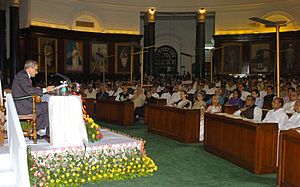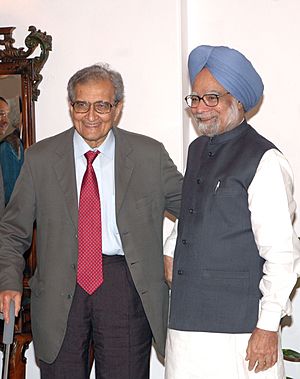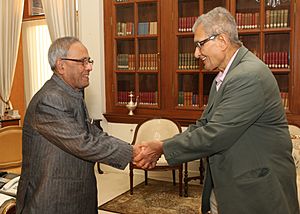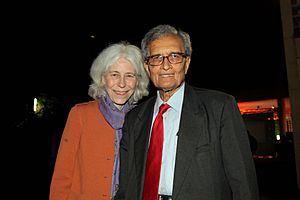Amartya Sen facts for kids
Quick facts for kids
Amartya Sen
|
|
|---|---|
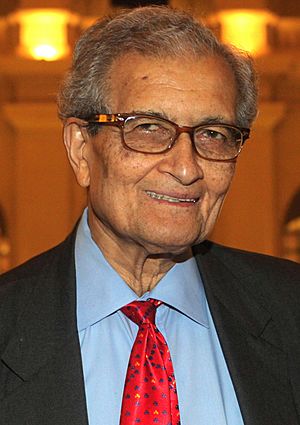
Sen in 2012
|
|
| Born |
Amartya Kumar Sen
3 November 1933 |
| Education |
|
|
Notable work
|
|
| Spouse(s) |
Eva Colorni
(m. 1978; died 1985)Emma Rothschild
(m. 1991) |
| Children | 4, including Nandana and Antara |
| Awards |
|
| Scientific career | |
| Institutions | |
| Doctoral advisor | Joan Robinson |
| Doctoral students |
|
| Influences | |
| Influenced |
|
Amartya Kumar Sen (born November 3, 1933) is a famous Indian economist and philosopher. He has taught and worked in England and the United States since 1972. In 1998, Sen won the Nobel Memorial Prize in Economic Sciences. He received this award for his important work on how societies can improve the well-being of their people.
Sen has also made big contributions to understanding how societies make choices, what makes a society fair, why famines happen, and how to measure a country's well-being. He is currently a professor at Harvard University. He also used to be the head of Trinity College, Cambridge. In 1999, he received India's highest civilian award, the Bharat Ratna. In 2020, he was given the Peace Prize of the German Book Trade for his work on global fairness and fighting inequality in education and healthcare.
Contents
Early Life and Education
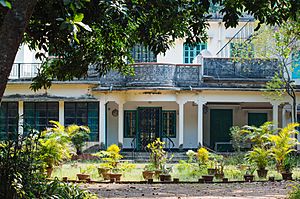
Amartya Sen was born on November 3, 1933, in Santiniketan, British India. The famous writer Rabindranath Tagore, who was the first Asian to win a Nobel Prize, gave Amartya Sen his name. It means "immortal" or "heavenly." Sen's family came from areas that are now part of Bangladesh. His father, Ashutosh Sen, was a chemistry professor at Dhaka University. His mother, Amita Sen, was the daughter of Kshitimohan Sen, a well-known scholar. Sen's grandfather was a close friend of Tagore.
Sen started school at St Gregory's School in Dhaka in 1940. In 1941, he moved to Patha Bhavana in Santiniketan. This school had modern ideas, like not focusing on exams or competitive testing. It also valued different cultures from around the world.
In 1951, he went to Presidency College, Calcutta, where he studied economics and mathematics. While there, he faced a serious illness but recovered after treatment. In 1953, he moved to Trinity College, Cambridge, where he continued his economics studies. He was also elected President of the Cambridge Majlis, a student society.
Even though he was still a PhD student at Cambridge, Sen was offered a job as the first professor and head of the Economics Department at the new Jadavpur University in Calcutta. He was only 22 years old, making him the youngest person to lead that department. He worked there from 1956 to 1958.
Sen also received a special fellowship at Trinity College, which allowed him to study any subject for four years. He chose to study philosophy. He explained that philosophy helped him understand his main interests in economics, like how societies make choices and how to study inequality.
Key Research and Ideas
Understanding Social Choices
Sen's early work helped develop the idea of social choice theory. This theory looks at how groups of people make decisions when everyone has different preferences. Another economist, Kenneth Arrow, had shown that it's very hard for voting systems to be perfectly fair when there are many options. Sen's work helped explain when Arrow's findings apply and how to make social choices better.
Why Famines Happen: Poverty and Famines (1981)
In his 1981 book, Poverty and Famines: An Essay on Entitlement and Deprivation, Sen argued that famines are not just caused by a lack of food. Instead, he showed that famines happen because some people don't have the "entitlement" or ability to get food. This means they might not have enough money, land, or other resources to buy or grow food, even if food is available.
He studied the Bengal famine of 1943. He explained that it happened because an economic boom in cities made food prices go up. Millions of rural workers couldn't afford food because their wages didn't increase enough. Sen famously wrote that "no famine has ever taken place ... in a functioning democracy." This means that democracies, where people can speak up and governments are accountable, are better at preventing famines.
Sen's work on famines and development has greatly influenced the "Human Development Report." This report is published every year by the United Nations Development Programme. It ranks countries based on how well people are doing, not just on their wealth.
What is True Equality? "Equality of What?" (1979)
Sen introduced a new idea called the "capability approach." He argued that we should measure how well a society is doing by looking at the real "capabilities" or freedoms its citizens have. For example, having the "right to vote" isn't enough if people can't actually get to the polls or don't have enough education to understand what they are voting for.
Sen believed that governments should focus on making sure people have the ability to do things they value. These "functionings" can be simple, like being healthy, or more complex, like being able to participate in community life. When people have these basic abilities, they can truly make their own choices.
Missing Women: "More than 100 Million Women Are Missing" (1990)
Sen wrote an article about "Missing Women." He looked at how unequal rights between genders in some developing countries, especially in Asia, led to more deaths among women. This happens due to factors like less access to healthcare or food for girls compared to boys.
Development as Freedom: Development as Freedom (1999)
In his 1999 book, Development as Freedom, Sen explained his capability approach further. He argued that true development isn't just about a country's wealth (like GDP). It's about increasing the real freedoms that people have.
Sen was inspired by a sad event he saw as a child. A poor worker was attacked because he had to go to a dangerous neighborhood to find work. This showed Sen how a lack of economic freedom could lead to terrible outcomes.
Sen described five types of freedoms important for development:
- Political freedoms: The ability for people to have a say in their government.
- Economic facilities: Access to resources and fair markets.
- Social opportunities: Access to things like healthcare and education.
- Transparency guarantees: Being able to trust others and know what's happening.
- Protective security: Having safety nets to prevent extreme hardship.
Sen believed these freedoms are not just the goals of development, but also the best ways to achieve it. He showed how they are all connected. For example, good education and health (social opportunities) help people make better economic choices and participate in politics.
What is Justice? The Idea of Justice (2009)
In his 2009 book, The Idea of Justice, Sen shared his own ideas about fairness. He suggested that instead of trying to find a perfect, ideal society, we should focus on comparing different situations and making them more just. He emphasized the importance of public discussion and focusing on people's capabilities, including human rights, when thinking about justice.
Career Journey
Sen started his teaching career in 1956 at Jadavpur University in India. He then became a fellow at Trinity College, Cambridge, from 1957 to 1963. He also visited the Massachusetts Institute of Technology in the United States, where he met other famous economists.
From 1963 to 1971, he taught at the Delhi School of Economics. During this time, he wrote one of his most important books, Collective Choice and Social Welfare. He also visited other top Indian economic schools and met with distinguished economists like Manmohan Singh, who later became India's Prime Minister.
In 1971, he joined the London School of Economics. From 1977 to 1988, he taught at the University of Oxford. In 1987, Sen joined Harvard University as a professor. In 1998, he became the head of Trinity College, Cambridge, making him the first Asian to lead a college at Oxford or Cambridge. In 2004, Sen returned to Harvard.
In 2007, he was chosen to lead a group planning to build Nalanda University. This university was meant to bring back the spirit of Nalanda mahavihara, an ancient center of learning. Sen was named the first chancellor of Nalanda University in 2012. He later decided not to seek a second term as chancellor.
Memberships and Associations
Amartya Sen has been the president of many important economic associations around the world. He has been called "the Conscience of the profession" and "the Mother Teresa of Economics" because of his work on poverty, human development, and fairness. However, he has said he doesn't try to live a life of self-sacrifice like Mother Teresa.
Sen has also been an honorary chairman and advisor for Oxfam, a charity that helps people in need worldwide. He is also a member of the Berggruen Institute's 21st Century Council and an Honorary Fellow at St Edmund's College, Cambridge.
Media and Culture
There are documentaries about Amartya Sen's life and work, including Amartya Sen: A Life Re-examined and The Argumentative Indian. His portraits are displayed in famous places like Trinity College and the National Portrait Gallery in London.
Personal Life and Beliefs
Amartya Sen has been married three times. His first wife was Nabaneeta Dev Sen, with whom he had two daughters, Antara and Nandana. After their marriage ended, he married Eva Colorni, an Italian economist. They had two children, Indrani and Kabir. Eva passed away in 1985. In 1991, Sen married Emma Georgina Rothschild, a history professor at Harvard University.
The Sens have homes in Cambridge, Massachusetts, and Cambridge, England. He also spends his winter holidays at his home in Shantiniketan, India. When asked how he relaxes, he says, "I read a lot and like arguing with people."
Sen is an atheist. He has noted that ancient Indian philosophy, particularly in Sanskrit, has a rich tradition of atheistic thought.
Awards and Honours
Sen has received over 90 honorary degrees from universities worldwide. In 2019, the London School of Economics created the Amartya Sen Chair in Inequality Studies in his honor. Some of his notable awards include:
- Nobel Memorial Prize in Economic Sciences, 1998
- Bharat Ratna (India's highest civilian award), 1999
- Honorary citizenship of Bangladesh, 1999
- Honorary Member of the Order of the Companions of Honour, UK, 2000
- National Humanities Medal, 2011
- Chevalier of the French Legion of Honour, 2013
- Johan Skytte Prize in Political Science, 2017
- Friedenspreis des Deutschen Buchhandels, 2020
- Princess of Asturias Award, 2021
See also
 In Spanish: Amartya Sen para niños
In Spanish: Amartya Sen para niños
- Abhijit Banerjee
- Feminist economics
- Human Development Index
- List of feminist economists
- Kerala model, a concept observed by Sen
 | Delilah Pierce |
 | Gordon Parks |
 | Augusta Savage |
 | Charles Ethan Porter |


